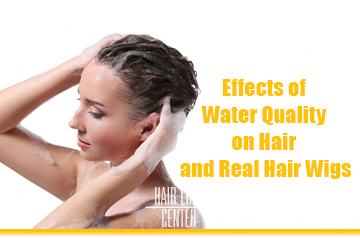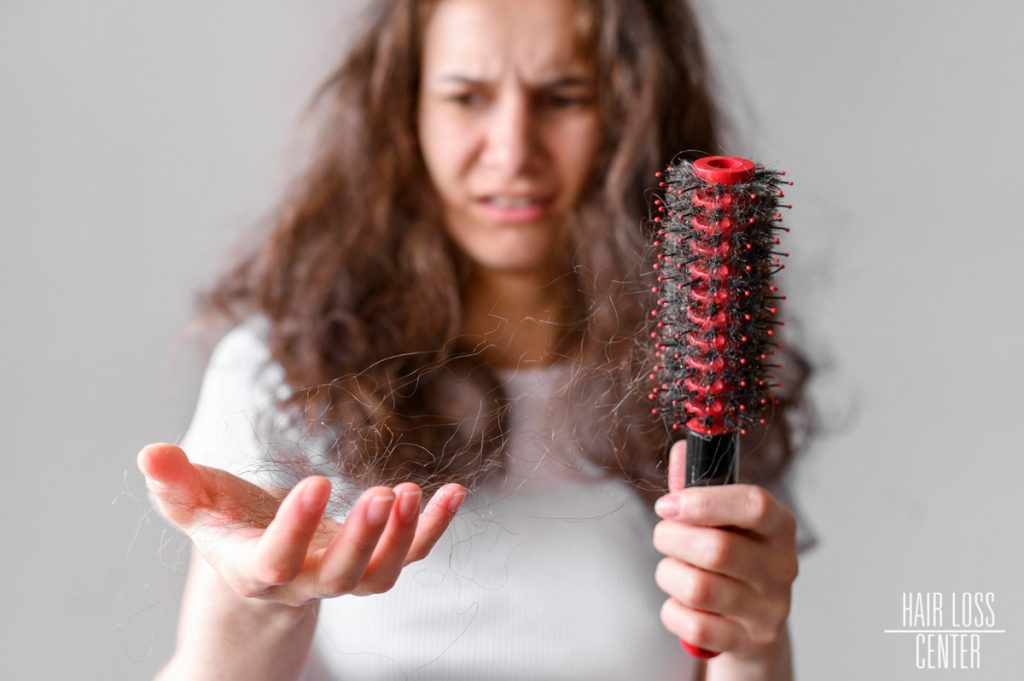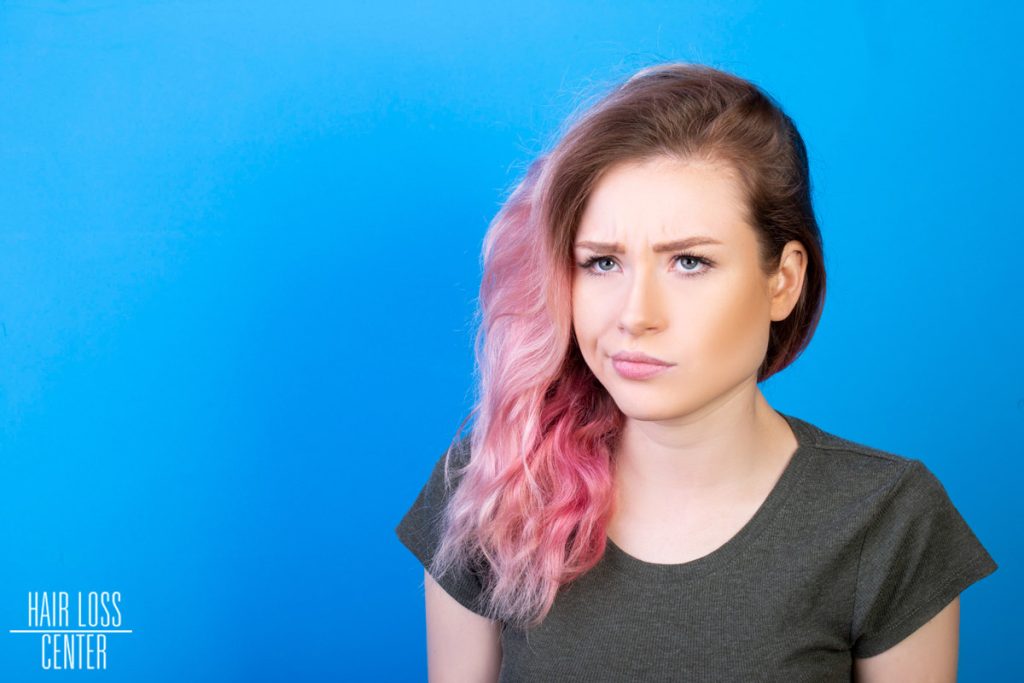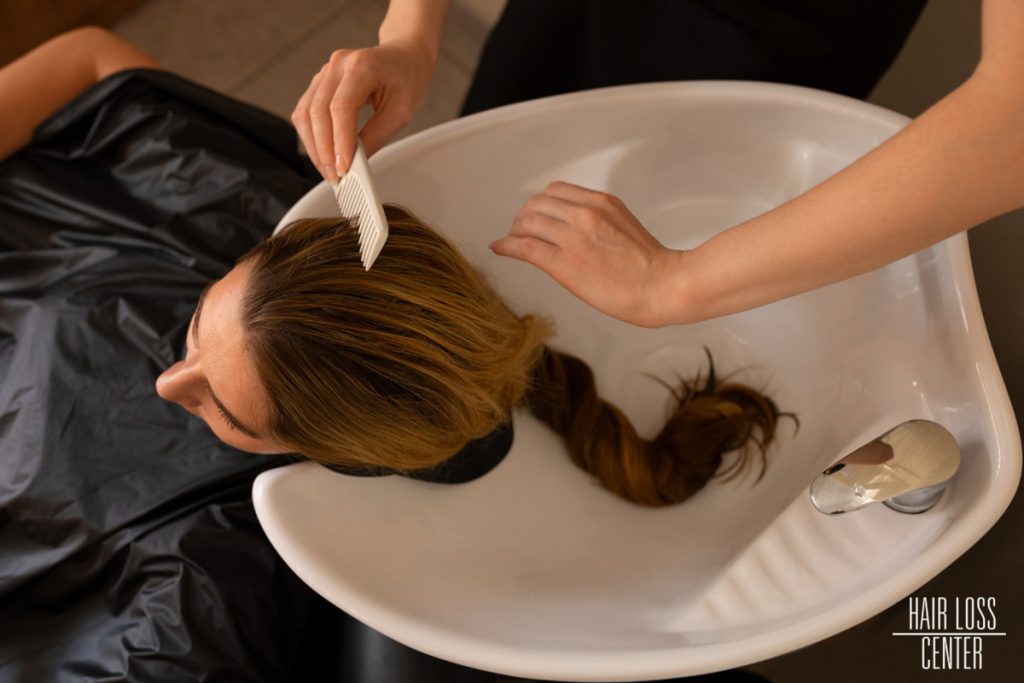

Effects of Water Quality on Hair, Real Hair Wigs and Extensions
The effects of water quality on hair are undeniable, no matter if it’s your own hair, a real hair wig, or hair extensions. Unfortunately, the problem is so widespread that a lot of scientific research has been done on this topic.
They all proved the negative effects of common water contaminants, like chlorine and high mineral content, on the health and appearance of hair and skin. Also, some of these contaminants don’t allow hair products, like your shampoo, to function properly.
So, what should we do?
First, we should increase our knowledge about how common contaminants in the water can affect our hair. Then, try to do some research to find out if the water in our area contains these contaminants. Finally, we should find a way to protect our hair and scalp (or natural hair wig and extension) against poor-quality water.
In this article, we’ll discuss all these subjects in detail. Read on if you’re worried about losing hair to low water quality.
Looking for a realistic human hair wig to protect your own hair and scalp against pollutants and the elements?
Call now and schedule a free consultation session!
Effects of Water Quality on Hair: What Are the Common Contaminants?
The quality of city water in different regions isn’t the same. The reservoirs and plumbing systems contain and add various substances that aren’t filtered completely before reaching our homes.
Sometimes, the amount of some of the contaminants is higher than normal. For example, according to the data from the Environmental Working Group (EWG), the amount of chloroform, fluoride, some substances, like haloacetic acids that are formed after adding chlorine, arsenic, etc., in some areas in California is higher than health guidelines.
So, let’s go over some of these common issues in our water and learn a bit more about water quality and hair loss.
– Hard Water and Hair Damage

When the amount of some minerals, such as calcium carbonate and magnesium sulfate, is more than it should be in water, it’s called hard water. A lot of research (like the Effects of Hard Water on Hair) has proved that washing your hair with hard water can cause a mineral buildup on the hair which causes
- dry hair,
- brittle and fragile hair,
- hair that’s difficult to manage.
Aside from mineral buildup on hair strands, hard water may interfere with what your shampoo and conditioner are supposed to do and reduce their effectiveness. As a result, it gets more challenging to clean your hair and achieve a healthy moisture balance.
– Chlorine and Hair Health
Chlorine is a rather harsh disinfectant that is usually added to municipal water to make it safe. However, it can cause the following issues with our hair:
- dry hair (because chlorine strips the natural oil from hair strands),
- frizzy hair (the cuticle is damaged by chlorine),
- damaged strands,
- coarse and straw-like hair,
- fragile strands with split ends.
What’s more, if you have dyed hair, chlorine can fade it or cause brassiness soon. Even those with natural light hair color aren’t immune to chlorine discoloration (greenish/bluish tint), especially those who frequently go to swimming pools.
Except for hair, chlorine can irritate your scalp as well and lead to dryness and flakiness. Particularly, those with sensitive scalps, like chemo patients, should protect their scalps from highly chlorinated water.
– Heavy Metals in Water and Hair
In many places, due to very old pipes and industrial pollution, high levels of metals, like iron, copper, and lead, in city water aren’t uncommon.
Lead is a toxic substance that can lead to hair loss, hair damage, and dryness when accumulated on hair strands and the scalp. Plus, having dandruff can be another consequence of too much lead in tap water.
Iron and copper can also lead to coarse and more fragile strands. In addition, people with lighter hair colors may experience a kind of discoloration over time (iron causes a reddish tint and copper causes a greenish/bluish tint).
Two other heavy metals, arsenic and mercury, cause hair loss and decreased hair growth as well.
– pH Balance and Hair Quality
Some other effects of water quality on hair come from higher pH levels. Slightly acidic water (4.5 to 5.5) is the best pH balance for our natural hair.
However, some contaminants and substances, like calcium, magnesium (hard water), bicarbonates, sodium hydroxide, and ammonia, raise the pH level of water and make it more alkaline.
Higher pH levels in water can
- damage the hair cuticle and make it more fragile.
- lead to frizzy and dry hair.
- cause breakage and split ends.
- fade the color of dyed hair.
– Water Fluoride and Hair Condition
Like chlorine, fluoride is also usually added to city water supplies for dental health. But too much of it in our water can negatively affect our hair.
- It can lead to a yellowish/brownish discoloration in people with naturally light hair color.
- Fluoride doesn’t allow hair strands to retain moisture balance, resulting in dry and brittle hair with split ends.
- Scalp is also irritated by fluoride which can lead to dandruff and eczema.
- Fluoride in water may disrupt the hair growth cycle and slow it down.
Check out My Water’s Fluoride to find out how much fluoride there is in your region’s water.
– Water Quality and Hair Color Fading

As we mentioned above, some water contaminants lead to hair color fading or discoloration over time.
Chlorine, copper, iron, hard water, and fluoride in tap water have the most impact on natural hair color or color-treated hair. They react with the hair’s melanin and lead to some sort of discoloration.
This problem is mostly found in people with blond, gray, or light brown hair.
Overall, common water contaminants and issues lead to the negative effects of water quality on hair, which mostly include dry and fragile hair that can shed easily. So, it’s crucial to avoid tap water’s effects on hair by following the tips below.
How To Protect Hair from Hard Water, Chlorine, Heavy Metals, and Other Contaminants?
There are a few effective ways to better hair care in areas with poor water quality.
– Installing Water Filters for Hair Protection
Various types of water filtration systems are commonly used in areas with water issues.
A whole-house water filtration system removes 98% of the harmful contaminants before the water reaches any faucet in your home. This means you can get pure and soft water even through the shower.
Two simpler and more cost-effective filtering options are using a shower head filter or a water softener. These are a kind of point-of-use filtration systems that allow you to enjoy the soft water benefits for hair and skin.
– Minerals in Water and Hair Care
To take better care of your hair and avoid mineral buildup on your strands, use a clarifying shampoo a couple of times a month.
In addition, regular deep conditioning can restore moisture balance and strengthen your hair strands. This is a great solution to get rid of dry and frizzy hair caused by mineral-rich water.
Plus, sulfate-free shampoos and conditioners are less harsh and don’t remove your hair’s natural oil. So, they’re better options to protect and revive damaged hair.
– Protect Hair from Chlorinated Water
If the water in your area contains too much chlorine, using a head shower filter can be a great solution. However, you should also try to limit your hair from exposure to chlorinated water in swimming pools and hot tubs.
Using a swim cap is helpful. Also, after swimming rinse your hair thoroughly with a suitable shampoo and filtered water. Besides, applying a conditioner can go a long way.
To sum up, you can use water filters and dry hair remedies for hard water and chlorinated water to reduce the bad effects of water quality on hair.
Reducing the Effects of Water Quality on Hair Wigs and Extensions
When it comes to washing human hair wigs and extensions, hard water and water contaminants cause almost the same problems they have for natural hair, such as dryness and dullness.
However, as these hair pieces aren’t actually attached to our scalp, the natural oil and nutrients provided by our scalp cannot help restore their moisture and strength. So, it’s essential to protect them from chlorinated and mineral-rich water to maintain their shine and natural appearance, and to extend their lifespan.
How to Protect Wigs from Hard Water and Other Water Issues

- Use water filters and water softeners to stop mineral buildup on the strands.
- If you don’t have a water filtration system, after washing the hairpiece, rinse it thoroughly with bottled water or any other purified water.
- Only use wig-friendly shampoos, conditioners, and other hair products. They’re sulfate-free and don’t cause excessive dryness.
- To moisturize the hair pieces, use deep conditioning treatments regularly.
- If it’s possible, don’t wear your hairpiece in swimming pools or hot tubs. If you do, make sure it’s rinsed completely with pure water afterward.
- These water quality issues damage your wig’s hair strands and their cuticle layer, so they become fragile. Therefore, heat-styling and other stresses can ruin them more easily.
Overall, if you notice your human hair wigs and extensions are dry, frizzy, dull, lifeless, heavy, and often tangled, it most probably is due to poor water quality in your region. Water treatment systems and the right wig hair care products can save the beauty of your hair pieces for a long time.
Do you need safe and effective hair care products? Check out our special hair products here.
FAQs about Tap Water Effects on Hair
As hard water is a common problem all over the US (and many other parts of the world), a lot of our clients are worried about it and here we briefly answer some of your most common questions about the effects of water quality on hair and natural hair wigs.
Should I Use Water Filters in California?
If you wish to protect your hair or wig hair from high levels of minerals and chlorine in the city water in California, yes. Unfortunately, the municipal water in most areas of California contains too much mineral and chlorine that can cause dryness, hair damage, hair thinning, and discoloration.
Is the Any Relationship Between Water Quality and Hair Styling?
Yes. Some water contaminants, such as iron, make your hair difficult to manage and style. However, all these negative effects of water quality on hair strands mean weaker hair that can more easily get damaged during styling, especially heat-styling. So, make sure you use heat-protectant products on your own hair or wig hair before heat-styling.
Does the Chlorine in Pool Water Damage My Human Hair Wig?
Chlorine makes hair strands dry, weak, and dull. Additionally, it can discolor or fade the hair fibers. So, the answer is yes. To protect your human hair wig, limit its exposure to chlorinated water as much as possible. In case of exposure, rinse it carefully with filtered water or bottled water and apply a wig conditioner after that.
Order Top-Grade European Human Hair Wigs That Last Long in Southern California
At Newport Hair Loss Centers in Los Angeles (310-991-0087), San Diego (949-640-4247), and Orange County (949-322-9555), we have gathered together a team of enthusiastic experts who not only craft European human hair wigs with the highest quality, but are also highly knowledgeable about hair loss in men, women, and kids and offer free consultation to anyone who needs help.
What we do here is beyond making wigs. We try to improve the lives of our hair loss patients and bring back health, peace, and confidence to them. Just give us a call to schedule your free consultation session.
LA OFFICE
Beverly Hills
8383 Wilshire Blvd, First Floor
Los Angeles, CA 90211
ORANGE COUNTY OFFICE
NEWPORT BEACH
240 Newport Center Drive, Suite 111
Newport Beach, CA 92660
SAN DIEGO OFFICE
LA JOLLA
4660 La Jolla Village Dr. Suite100
San Diego, CA 92122
NEWPORT HAIR LOSS CENTER
Newport Hair Loss Center gives hair loss sufferers a way to restore their appearance and boost their confidence, whether they are suffering from trichotillomania, alopecia, or are currently going through chemotherapy.
Site Map

